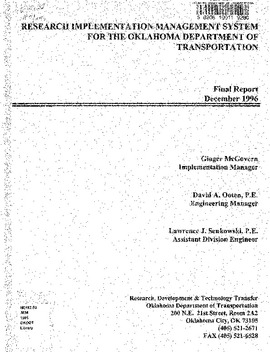| dc.description.abstract | In the past, implementation of resear ch project findings has been an informal process at the Oklahoma D epartment of Transportation. New federal requirements and Department needs have prompted the Office of Research to establish a formal set of standard procedures for implementation. The resulting Research Implementation Management System (RIMS) is a systematic process designed to improve the implementation of research project findings. This report presents a review of the literature, survey of states, and needs analysis performed to define the requirements of the system, then describes the procedures which comprise the RIMS. The RIMS procedures are categorized according to planning, execution, and evaluation phases. In the planning stage, proposals are evaluated for potential to produce practical, useful results, and acceptable projects have an estimated benefit/cost ratio calculated. After project completion; an implementation planning meeting is held where the strategies/tasks needed to achieve implementation are determined. A formal implementation plan is developed which includes the strategies, assigns responsibilities for tasks, and projects the time/resources needed to achieve the objectives. As the implementation plan is c arried out (execution phase), activity is documented by responsible parties and progress is monitored/reported by the Project Manager and Implementation Manager. After three years, a Research Project Cost and Savings Report is prepared to summarize how the research findings were used, the total costs of the project and the implementation effort, and the estimated tangible benefits. The final benefit/cost ratio is compared to a preliminary estimate. The effectiveness of the implementation effort is evaluated annually by the Implementation Manager and recommendations for improvement made. | |
